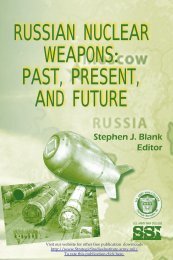The United States and China in Power Transition - Strategic Studies ...
The United States and China in Power Transition - Strategic Studies ...
The United States and China in Power Transition - Strategic Studies ...
You also want an ePaper? Increase the reach of your titles
YUMPU automatically turns print PDFs into web optimized ePapers that Google loves.
the Ch<strong>in</strong>ese, Mongols, <strong>and</strong> the Turkic ethnic groups.<br />
This l<strong>and</strong> has also witnessed great power <strong>in</strong>terference<br />
from time to time, most notably by Russia <strong>and</strong> Great<br />
Brita<strong>in</strong>. After a long fight aga<strong>in</strong>st the Turkic ethnic<br />
groups <strong>and</strong> Russia s<strong>in</strong>ce the 1750s, <strong>Ch<strong>in</strong>a</strong>’s last dynasty,<br />
the Q<strong>in</strong>g, secured control of the entire region<br />
<strong>and</strong> named it the X<strong>in</strong>jiang Prov<strong>in</strong>ce of <strong>Ch<strong>in</strong>a</strong> <strong>in</strong> 1884.<br />
However, the Q<strong>in</strong>g Dynasty fell <strong>in</strong> 1911. X<strong>in</strong>jiang once<br />
aga<strong>in</strong> fell prey to <strong>in</strong>ternal turmoil <strong>and</strong> external <strong>in</strong>terference.<br />
<strong>The</strong>re were repeated attempts to create East<br />
Turkistan as well. In 1949, the CCP-led PLA “liberated”<br />
X<strong>in</strong>jiang, <strong>and</strong> it has been under the tight control<br />
of the PRC ever s<strong>in</strong>ce. 194<br />
However, the CCP did not put the X<strong>in</strong>jiang problem<br />
to rest for good. <strong>The</strong> East Turkistan separation<br />
movement did not go away, either. <strong>The</strong> reasons are<br />
twofold. First <strong>and</strong> foremost, <strong>Ch<strong>in</strong>a</strong> failed to develop<br />
a sound political <strong>and</strong> economic system that could accommodate<br />
the complicated relations <strong>in</strong> X<strong>in</strong>jiang.<br />
Contrary to the CCP’s propag<strong>and</strong>a, X<strong>in</strong>jiang has<br />
never become a melt<strong>in</strong>g pot for the Han Ch<strong>in</strong>ese <strong>and</strong><br />
various Turkic ethnic groups <strong>in</strong> any measure. Second,<br />
the external environment surround<strong>in</strong>g X<strong>in</strong>jiang provides<br />
“fertile grounds” for the separatist movement to<br />
grow. Indeed, X<strong>in</strong>jiang’s unsettl<strong>in</strong>g <strong>and</strong> conflict-laden<br />
neighbors, namely Afghanistan, Pakistan, <strong>and</strong> the<br />
Turkic republics of the Soviet Union, gave X<strong>in</strong>jiang<br />
more than enough reasons to be unsettled as well.<br />
A turn<strong>in</strong>g po<strong>in</strong>t came at the end of the Cold War.<br />
<strong>The</strong> collapse of the Soviet Union gave <strong>in</strong>dependence<br />
to a number of former Soviet republics <strong>in</strong> central Asia<br />
border<strong>in</strong>g X<strong>in</strong>jiang. <strong>The</strong>y are Kazakhstan, Kyrgyzstan,<br />
Tajikistan, Uzbekistan, <strong>and</strong> Turkmenistan. <strong>The</strong>se are<br />
the countries def<strong>in</strong>ed primarily by the k<strong>in</strong>d of people<br />
who bear the name of these new nations (the suffix<br />
“stan” simply means the l<strong>and</strong>).<br />
169

















